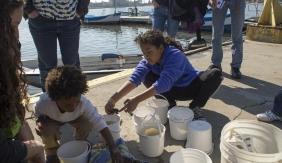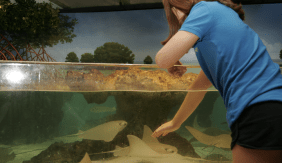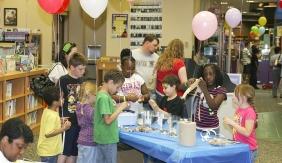What is Informal STEM Education?
Informal STEM education refers to lifelong learning in science, technology, engineering, and math (STEM) that takes place across a multitude of designed settings and experiences outside of the formal classroom.
People of all ages learn science in an increasingly wide variety of ways. Formal schooling is only one part of a larger ecosystem of science, technology, engineering and math (STEM) learning that also occurs throughout one’s lifetime. A consensus report from the National Research Council released in 2009 identified everyday experiences, designed settings, and programs for learning as three contexts where people learn science outside of the classroom. When we talk about the field of informal STEM education, we are referring to experiences, settings, or programs that are designed, implemented, and assessed by a community of dedicated, trained practitioners. This includes:
- Citizen Science, Community Science and Public Participation in Scientific Research
- Technology-Enhanced Learning
- Living Collections (Zoos, Aquaria, Nature Settings)
- Making and Tinkering
- Media, e.g. television, film, radio, and podcasts
- Public Libraries
- Public Science Events
- Science Centers and Museums
- Science Communication
- Youth, Afterschool, and Out of School Time programs
Informal STEM education is informed and supported by a knowledge base of evidence from evaluation studies, learning and other social science research, and wisdom from practice. From 2007-2022 the Center for Advancement of Informal Science Education (CAISE) supported informal STEM education by providing web infrastructure and resources for those working in and with the field. Review a brief summary of CAISE activities over three award periods.
Resources for Getting Started with ISE
Inclusive Science Communication Starter Kit: This Starter Kit is intended to help anyone who communicates with others about STEMM do so in ways that 1) seek and value a wide variety of perspectives, 2) recognize how a person’s multiple identities might affect their relationships with STEMM, and 3) yield equitable outcomes that build and sustain trust.
STEM For All Multiplex: Over 170 NSF AISL projects have been featured in videos on this website. The Multiplex is an online, free, interactive platform featuring over 1000 short videos that showcase federally funded projects aimed at transforming science, technology, engineering, math, and computer science learning.
Learning Science in Informal Environments: Places, People, and Pursuits: In January 2009, the U.S. National Research Council released this consensus report about informal science education, which is still considered to be one of the most important pieces of literature in the field. Philip Bell, co-chair of the committee that wrote the report and Associate Professor of Learning Sciences at the University of Washington, Seattle, stated that "Learning is broader than schooling, and informal science environments and experiences play a crucial role. These experiences can kick-start and sustain long-term interests that involve sophisticated learning."
Documenting and Assessing Learning in Informal and Media-Rich Environments: A Report to the MacArthur Foundation: This 2012 report summarizes an extensive review of the literature on assessment of learning in such informal settings as after-school programs, museums and science centers, community-based organizations, and online communities.
Identifying and Supporting Productive STEM Programs in Out-of-School Settings: In 2015, the U.S. National Academies of Sciences, Engineering and Medicine released this consensus report that identified three criteria of program that produce positive outcomes for learners. The study found that effective STEM out-of-school programs: 1. engage young people in intellectually, academically, socially and emotionally 2. provide firsthand experiences phenomena and materials and 3. engage young people in sustained STEM practices.
Everyday Science Learning and Equity: Mapping the Contested Terrain: This 2017 article argues that while research on science learning outside of school has a relatively long history, for historical and practical reasons the field has privileged studying learning in museums and science centers and after school programs. More recently researchers have begun investigating science learning in such spaces as the home, collective hobby practice, medical visits, DIY venues, neighborhood associations and community organizing in ways that honor the diversity of the participants and may give rise to new understandings and discourses of equity.
Equity and Evaluation in Informal STEM Education: This 2019 chapter in a special issue of the American Evaluation Association's New Directions in Evaluation journal explores the role that evaluation can play in helping the informal STEM education field adopt more inclusive practices and achieve greater equity through evaluation that addresses sociopolitical contexts and reflects the perspectives and values of non-dominant communities. A full text pdf of the chapter is available to logged-in members of InformalScience.org by searching here.


